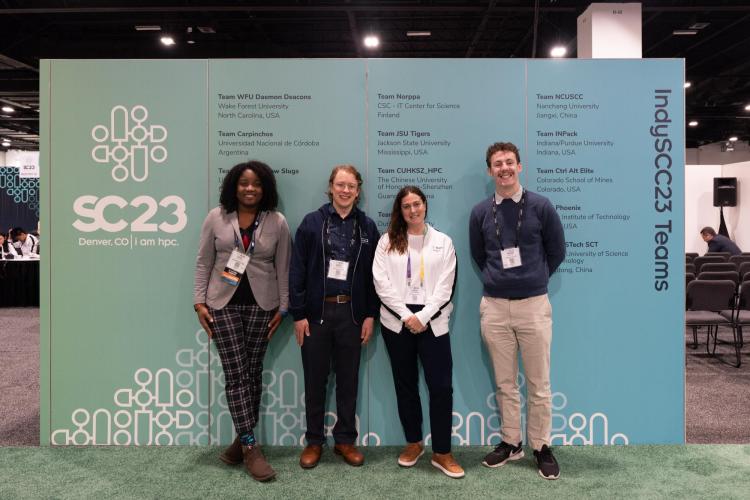
The Student Cluster Competition (SCC) at the SC conference has long been a cornerstone of the Students@SC program, showcasing the skills of students in the field of High-Performance Computing (HPC). Student teams earn sponsorships from hardware and software vendors and build small clusters, benchmark scientific applications, and compete in a non-stop 48-hour challenge. The SCC is intended to foster interest and experience in HPC, facilitating students’ transition into the professional HPC community. The competition attracts highly skilled participants who invest significant time and effort in preparation throughout the year. These students not only gain valuable HPC skills but also find themselves on the radar of hiring institutions and tech companies.
The IndySCC is an event sharing the goals of the SCC but with an emphasis on education and inclusion, intended for less-experienced teams. The event provides a platform for teams to compete remotely, utilizing provided hardware, opening doors for a broader demographic of students. The 2023 IndySCC contest included 15 teams from 7 countries, including China, Finland, Argentina, Germany, the UK, Colombia, and the United States.
IndySCC Vice Chair Layla Freeborn from CU Boulder stated “Few cluster teams have the experience or connections to secure industry hardware sponsorships or the funds to fly an entire team to the SC conference. The IndySCC was born out of a desire to create an on-ramp to the SCC and diversify the teams competing each year. The competition is only in its third year, but it's already been hugely successful, with teams from five continents participating. Given how closely the IndySCC's mission aligns with CU Boulder's diversity initiatives, donating nodes to the competition felt like a great use of retired hardware.”
Faculty and staff from universities and national laboratories support teams during the months leading up to the conference, creating a focused and educational experience. The University of Colorado Boulder (CU Boulder) played an integral role in supporting the IndySCC23 competition, providing access to 150 compute nodes from the retired RMACC Summit supercomputer. Administrators from CU Boulder Research Computing and CU Boulder Networking operations provided technical support throughout the event. Several staff members also served as committee members, providing organizational support, managing communications, and judging student posters. The culmination was a 48-hour contest held prior to the SC Conference, November 3rd-5th, allowing teams to showcase the knowledge and skills acquired during their preparation.
Student teams applications covered a variety of topics including GROMACS, a popular molecular dynamics software, Community Earth System Model (CESM), a global climate model that simulates climate states, and HPL, a common implementation of the High Performance Computing Linpack Benchmark. The top three teams were Team Carpinchos from Universidad Nacional de Cordoba in third place, Team Norppa from CSC IT in second place and the winners were Team SCT-ZJU from Zhejiang University!!
The goal of IndySCC goes beyond competition; it aims to democratize access to HPC education and create a more diverse talent pool. This initiative not only expands opportunities for students to experience the thrill of the SCC but also seeks to establish a sustained pipeline for diverse talent.
IndySCC is a testament to the commitment of the HPC community to cultivate a more inclusive and accessible landscape for aspiring professionals. Through events like IndySCC, the industry is actively working to break down barriers, empowering students from all backgrounds to engage with the exciting world of high-performance computing.
For more information about IndySCC, please visit https://sc23.supercomputing.org/students/indyscc/.
